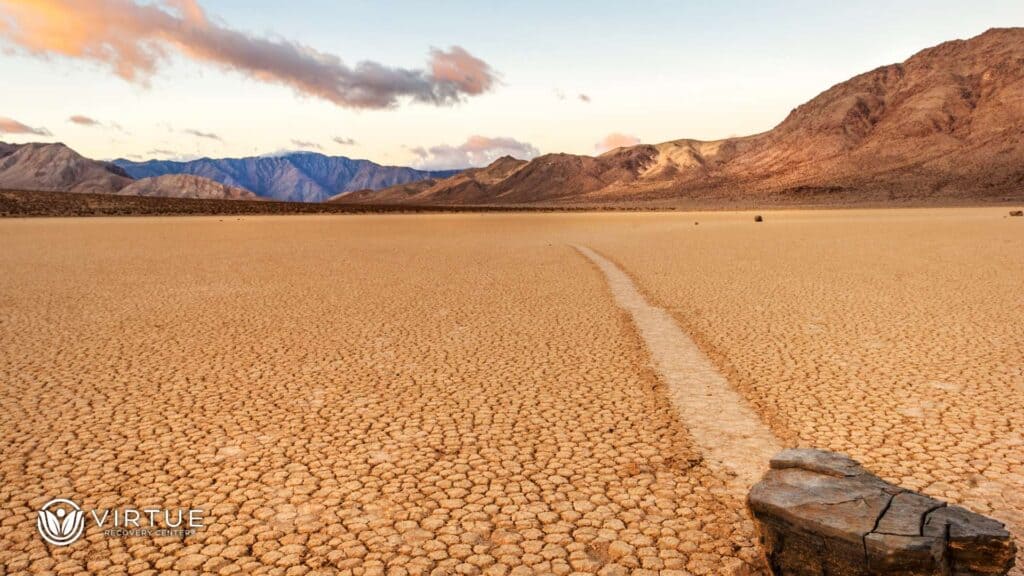Key Takeaways
- Mental health problems such as anxiety, depression, and substance abuse are also known to be worsened by heat and isolation, which is common in the desert.
- The use of substances is expected to deal with the stress and discomfort of living in extreme desert conditions.
- It is, however, essential to seek treatment in desert areas since it is hard to get treatment for mental health and addiction.
Introduction
Lifestyle in the desert environment is quite different and can cause serious problems that affect mental health and lead to addiction. The scorching temperatures, arid climate, and limited water supply, combined with the experience of living in desert environments like Las Vegas, can take a toll on both the body and mind. Therefore, anyone living in or planning to live in a desert area must know the relationship between these environmental factors and mental health. This article provides information on how the desert climate impacts mental health and addiction, as well as how one can cope with these issues and when it is time to seek professional assistance.
How Desert Climates Affect Mental Health
The Impact of Extreme Heat
Desert climates are well known for their hot temperatures, rising to over 100 degrees Fahrenheit. High temperatures can cause physical and mental strain if exposed to them for a long time. Some of the effects of heat include heightened sensitivity, anxiety, and, in some cases, depression. Excessive heat can be uncomfortable and can make it hard for one to find comfort, and this can also worsen mental health issues. Also, heat exhaustion and dehydration, which are typical for the desert climate, may cause confusion, mood swings, and poor cognitive performance, which also affects mental health.
Social Isolation in Desert Regions
Another major problem that affects people in the desert is social isolation. Some desert regions are not densely populated, and people live in different settlements long distances apart. This isolation can cause feelings of loneliness and depression, especially for those who are already having mental health problems. There are no mental health clinics or support groups in the community, which makes it even harder for people to come forward. This means that people in desert areas may not be able to seek help for their mental health issues quickly and may resort to using substances to cope.
Sleep Disruptions Due to Climate
Sleep is very important for the well-being of the mind, but in desert regions, temperatures can be very high or very low, affecting sleep quality. High nighttime temperatures can cause sleep disturbances and, therefore, cause fatigue, irritability, and cognitive impairment. Poor sleep quality is a chronic problem that worsens mental health and makes a person more susceptible to addiction. People may resort to the use of alcohol or drugs to help them deal with their sleep issues, which in turn results in addiction and worsening of their mental health.
The Link Between Desert Climate and Addiction
Substance Abuse as a Coping Mechanism
In extreme conditions of the desert, people may use substances like alcohol or drugs to help them deal with the physical and psychological stress of the environment. The heat, isolation, and lack of sleep can cause people to turn to substances as a way of coping with the stress. However, this is a dangerous process since the momentary solace found in substances makes one take more of it. In places like Las Vegas, where substances are easily accessible, the chances of developing an addiction are higher.
The Role of Environmental Stress in Addiction Development
Stress that is experienced daily due to living in a desert climate can reduce the resilience of an individual to stress, thus making them prone to addiction. Conditions like heat, dryness, and isolation can make people feel uncomfortable all the time, which makes it hard for them to seek a healthy way of dealing with it. In time, this stress may result in the use of substances as a way of coping, and thus, the cycle of addiction is reinforced.
Challenges in Accessing Treatment
It is challenging to seek addiction treatment in desert areas because there are few treatment facilities, few specialized services, the extended distance from the centers, and the cultural attitudes towards seeking help. In many desert regions, there are few options for mental health and addiction treatment, which means that people who need help may not be able to get it. This lack of access can worsen the issues of those who are battling addiction, and this is why it is crucial to look for local support or seek help from other specialized treatment centers such as Virtue Recovery Las Vegas.
Strategies for Managing Mental Health and Addiction in Desert Climates
Staying Hydrated and Managing Heat Stress
Some of the most effective ways of coping with mental health issues in a desert environment include drinking enough water and avoiding heat exhaustion. Other ways to help reduce heat’s impact on the body and mind include taking enough water and not exposing oneself to the heat for long. Other ways of coping include not going out in the sun, especially during the middle of the day, and using air conditioners to control temperature, which can affect the individual’s physical comfort and mental health.
Building a Support Network
Preventing social isolation is vital for good mental health in the desert environment. Having a sound support system in the form of family, friends, or other groups in the community can help in dealing with the various difficulties that come with living in extreme conditions. For those who are lonely, it is recommended to find out what is available in the local community, try to find online groups, or attend support groups to at least have a feeling that they are not alone.
Seeking Professional Help
Because people living in the desert environment face specific difficulties, it is crucial to turn to specialists in case of mental disorders and addiction. Mental health professionals can offer the required help and care for people in these settings and offer them the proper treatment. Facilities such as Virtue Recovery Las Vegas provide unique treatment that takes into consideration the effects of the desert environment on the mind and substance abuse. It is possible to make a significant change in managing these problems through counseling, therapy, or rehabilitation programs.
Conclusion
Desert climates are characterized by high temperatures and lack of human contact, which can lead to serious psychological problems and addiction. Such environments are not easy to manage, and in most cases, professionals must intervene. It is, therefore, essential to be able to identify the symptoms of mental health disorders and addiction and seek help to prevent them in the desert environment.
If you or a loved one is struggling with addiction, call Virtue Recovery Las Vegas at 866-520-2861 to get the help and support you need.
FAQs
How does extreme heat in desert climates affect mental health?
Heat can cause stress, anxiety, and irritability to rise. It also worsens other mental health conditions, such as depression, when one is exposed to high temperatures for a long time.
Why are people in desert climates at higher risk of addiction?
The conditions of the desert environment, including high temperatures and lack of social interaction, can cause stress, and some people may resort to substance use.
Can living in a desert climate disrupt sleep?
Yes, the high temperatures in desert climates can disrupt sleep patterns, leading to fatigue and cognitive decline, which can, in turn, contribute to mental health issues and addiction.
What are the challenges of accessing addiction treatment in desert regions?
There are several barriers to accessing treatment, including the geographical location of the treatment facilities, the lack of availability of specialized services, and the cultural barriers that are associated with the stigma of seeking help. Additionally, financial constraints often exacerbate these challenges in addiction treatment, as many individuals may not have adequate insurance coverage or the means to pay for out-of-pocket expenses. This results in a systematic inequity, further limiting access to necessary care for vulnerable populations. Addressing these multifaceted barriers is essential to ensure that everyone has the opportunity to receive the support they need for recovery.
How can staying hydrated help manage mental health in a desert climate?
Water is essential in the desert to prevent heat stroke and other related ailments that may impact the body and brain. It is also essential for the body and can help avoid anxiety, depression, and substance abuse.
What role does social isolation play in mental health issues in desert areas?
Lack of social contact is one of the major causes of mental health problems in desert areas. Lack of companionship and isolation may cause depression, anxiety, and may increase the chances of substance abuse.
How can someone build a support network in a desert climate?
Engaging in community organizations, social media platforms, and other relevant support groups for people in similar situations can develop support networks.
Why is professional help essential for managing mental health and addiction in desert climates?
This is because professional help provides a more systematic way of handling the situation, a specific treatment plan, and tools suitable for the desert environment to enhance the healing process.
What types of addiction treatment are available in desert regions like Las Vegas?
In cities such as Las Vegas, the treatment centers provide different levels of care, such as inpatient and outpatient, counseling, detoxification, and other related services for addiction and mental health disorders.
How can Virtue Recovery Las Vegas help individuals struggling with addiction in desert climates?
Virtue Recovery Las Vegas is a facility that offers treatment services to people who are in desert areas and has specific programs that address the physical and psychological aspects of addiction.
Can Desert Climate Exacerbate Mental Health and Addiction Issues?
The harsh conditions of a desert climate can exacerbate mental health and addiction issues due to the extreme isolation, high temperatures, and lack of resources. Those struggling with addiction may find it difficult to access support services, further worsening their situation. Moreover, how drug addiction impacts oral health can create additional health complications in such environments.
Resources
https://www.ncbi.nlm.nih.gov/pmc/articles/PMC10310343/
https://www.apa.org/monitor/2024/06/heat-affects-mental-health
https://www.psychiatry.org/news-room/apa-blogs/extreme-heat-can-take-a-toll-on-mental-health
https://www.health.ny.gov/diseases/aids/consumers/prevention/oduh/docs/extreme_heat_clinicians.pdf









